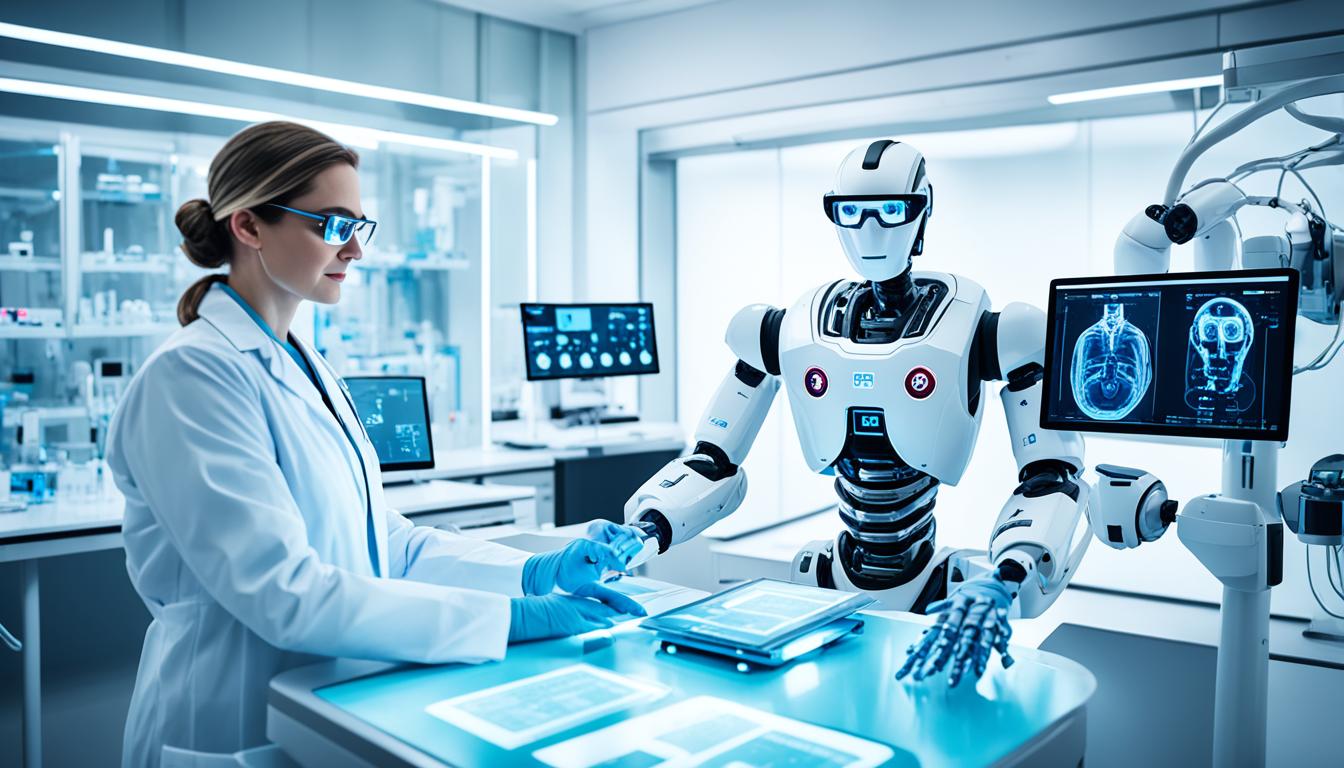Healthcare AI is changing the game in medicine. It uses machine learning and advanced algorithms to better care for patients and find new medical breakthroughs. AI helps doctors make more accurate diagnoses and create treatment plans that fit each patient’s needs.
Machine learning in healthcare looks at huge amounts of patient data to make diagnoses and treatments better. AI systems use algorithms and data models to spot patterns and predict health risks. This lets doctors act early to prevent problems.
Medical natural language processing is a big deal in healthcare AI. It helps find important info in medical records and research papers. This makes research and decision-making faster and more efficient. AI can quickly find key insights in medical texts, helping doctors make smart choices.
Clinical decision support systems use AI to give doctors real-time advice on treatments. They look at patient data, medical knowledge, and guidelines to help in tough medical situations. These systems help doctors make better decisions, which can lead to better patient care and fewer mistakes.
Healthcare AI is leading to more personalized and effective treatments. By combining machine learning, natural language processing, and decision support systems, doctors can give treatments that really fit what each patient needs.
Key Takeaways:
- Healthcare AI uses machine learning and advanced algorithms to improve patient care.
- Machine learning in healthcare looks at lots of patient data to make diagnoses and treatments better.
- Medical natural language processing makes research and decision-making more efficient by finding important info in medical records and papers.
- Clinical decision support systems use AI to give doctors real-time advice on treatments.
- Healthcare AI leads to more personalized, precise, and effective medical solutions.
Enhancing Medical Imaging with AI-powered Diagnostics
AI-powered diagnostics are changing medical imaging a lot. They make things more accurate and efficient. These systems use artificial intelligence to look at images like X-rays and MRIs. They can spot problems better than before.
These systems use deep learning and computer vision to find tiny patterns. This means they can catch things that doctors might miss. This leads to better diagnoses and helps patients get the right treatment.
AI helps doctors focus on urgent cases too. It points out important findings quickly. This means patients with serious conditions get help faster, which is good for their health.
AI also makes waiting times shorter for patients. Doctors can look at images faster with AI’s help. This makes patients happier and helps hospitals work better.
AI is great at helping with tricky cases too. It gives doctors a boost in analyzing images. This means patients get the right diagnosis and treatment for rare or complex conditions.
AI is changing medical imaging for the better. It makes things more accurate, efficient, and fast. This is good news for doctors and patients. The future of medical imaging looks bright thanks to AI.
For more info on healthcare AI and its role in medical solutions, check out this link.
Accelerating Drug Discovery with AI
AI is changing how we find new drugs by making the process quicker and more efficient. It uses advanced algorithms to look through huge amounts of data. This includes things like patient info, genetic details, and the makeup of molecules. This helps find potential drugs and see if they will work well and be safe.
Using AI in drug discovery helps scientists find promising molecules faster. It also makes designing new drugs better. This makes getting life-saving treatments to patients quicker.
AI is great at efficient drug screening. Machine learning algorithms can go through huge lists of chemicals quickly. They pick out the ones most likely to work as treatments. This lets researchers focus on the best options, saving time and money.
AI also leads the way for personalized medicine. It looks at a person’s genes and other health info to suggest the best treatments. This means less chance of bad reactions and better results for patients.
As AI gets better, its role in finding and developing drugs will keep growing. AI could change the drug industry a lot. It could lead to faster, more precise, and treatments made just for you.
If you’re interested in learning more about AI in healthcare, check out this article.
Transforming Patient Monitoring with AI
The field of patient monitoring is changing fast thanks to artificial intelligence. AI makes remote patient monitoring better. It helps spot health problems early and improves care.
AI systems for patient monitoring use predictive analytics. They look at data from wearables, health records, and other devices. This lets doctors see early signs of health issues and act fast.
AI helps doctors make better decisions by analyzing vital signs and health trends. It helps catch health problems early. This can cut down on hospital visits and save resources.
AI also gives personalized advice on how to live healthier and manage diseases. This helps patients take charge of their health. It leads to better health and happiness.
AI’s impact isn’t just in hospitals. Patients can now be monitored at home. This means fewer hospital trips and more comfort.
In summary, AI is changing how we care for patients. It helps spot health problems early, improves care, and lets patients manage their health better. With AI, the future of patient monitoring looks bright for healthcare.
For more info on healthcare AI, check out this link.
Advancing Surgical Robotics and AI-assisted Surgery
The field of surgical robotics has seen big changes thanks to Artificial Intelligence (AI). AI-powered surgical robots are changing the game in medical robotics. They’re making big steps forward in surgery.
These robots use AI to help surgeons with tough procedures. They give surgeons better precision and control. AI looks at data from tools, images, and patient info to help during surgery.
This mix of AI and surgical robots means better surgery results, fewer complications, and safer patients. Surgeons get help from AI systems, making them more accurate and efficient. This means patients have shorter stays, quicker recovery, and less scarring.
AI is also making minimally invasive surgery (MIS) better. With AI help, surgeons can do precise surgeries through small cuts. This means less harm to the patient, quicker healing, and shorter recovery times.
Surgical robots with AI are changing the future of medical care. They help surgeons handle complex cases better, opening new possibilities. As AI in medical robotics keeps getting better, we’ll see more precise surgeries and a new healthcare future.
Discover the exciting world of AI-assisted surgery and its future by visiting these links: Link 1 and Link 2.
Harnessing Predictive Analytics in Healthcare
Predictive analytics powered by AI is changing healthcare. It helps make decisions based on data, use resources better, and manage patients proactively. By looking at lots of patient data, AI can spot patterns that lead to better care.
AI can predict and stop disease outbreaks. It looks at a lot of data to find early signs of an outbreak. This lets healthcare systems act fast to stop the outbreak.
Predictive analytics also helps use healthcare resources well. AI looks at past data and current info to see where demand is high. This helps healthcare providers use resources where they’re needed most, so patients get care on time.
It also helps manage patients better. By finding patients at high risk, healthcare providers can help them early. This leads to better patient outcomes and lowers hospital readmissions and costs.
“AI predictive analytics in healthcare has the potential to transform patient care, enabling personalized and evidence-based medicine.”– Dr. Catherine Smith, Chief Medical Officer at Health Innovations
AI predictive analytics is changing healthcare for the better. It helps make decisions based on data, use resources well, and manage patients proactively. By analyzing lots of data, healthcare providers can improve patient care and health outcomes for everyone.
Benefits of AI Predictive Analytics in Healthcare:
- Facilitates data-driven decision-making
- Optimizes healthcare resource allocation
- Enables proactive patient management
- Identifies high-risk patients for targeted interventions
- Reduces hospital readmissions and healthcare costs
Conclusion
Healthcare AI is changing the game in medicine, making patient care much better. It uses machine learning and other tech to improve health care. This leads to better and faster diagnoses, custom treatment plans, and new drug discoveries.
AI is especially changing how we watch over patients. Doctors can now check on patients from anywhere, in real-time. This means they can act fast and give care that fits each patient’s needs. Also, AI helps make surgery safer and less invasive, which is good news for patients.
AI is also great at predicting health problems before they happen. By using data, doctors can catch issues early and treat them right away. This new way of using data is changing how we give health care, making it more efficient and effective.
As AI in Healthcare keeps getting better, the possibilities for improving patient care are endless. By using AI and data, doctors can give patients care that is more precise and tailored to their needs. The future of health care looks bright, thanks to these AI advancements.
FAQ
What is Healthcare AI?
Healthcare AI uses AI technologies like machine learning and predictive analytics in healthcare. It aims to change patient care and find new medical breakthroughs. It does this by using advanced algorithms and analyzing data.
How is machine learning used in healthcare?
Machine learning helps healthcare by looking at lots of patient data. It helps improve diagnosis and treatment. By learning from big datasets, AI systems spot patterns that doctors might miss. This leads to better and more tailored medical care.
What is medical natural language processing?
Medical NLP is about getting useful info from medical records and texts. It makes research and decision-making faster and more accurate. This helps move healthcare forward with data.
How do clinical decision support systems work?
Clinical decision support systems use AI to give quick treatment advice. They look at patient data and medical studies. This helps doctors make better, evidence-based choices for patients.
How does AI-powered diagnostics improve medical imaging?
AI in medical imaging looks at images like X-rays and MRIs to find problems accurately. It uses machine learning to spot things that doctors might miss. This makes diagnosis more accurate and quicker.
What are the benefits of AI in drug discovery?
AI makes finding and developing new drugs faster and more efficient. It looks at huge amounts of data, like patient info and genetic details. This helps find new drug possibilities and make them better, leading to personalized treatments.
How does AI transform patient monitoring?
AI lets doctors monitor patients from afar and catch health issues early. It looks at data from wearables and health records. This helps predict health problems, prevent them, and keeps patients safer at home.
How does AI advance surgical robotics?
AI helps surgeons with robots in complex surgeries. These robots use AI to guide surgeons with real-time data. This makes surgeries more precise, safer, and leads to better results.
What is the role of predictive analytics in healthcare?
Predictive analytics uses AI to make healthcare decisions smarter and more efficient. It looks at lots of patient data to spot trends and predict health issues. This helps plan healthcare better and improve patient care.
How does Healthcare AI revolutionize patient care?
Healthcare AI brings new tools like machine learning and natural language processing to healthcare. These tools help with accurate diagnoses, personalized treatments, and better drug discovery. They also improve surgery and patient management. This leads to better healthcare and outcomes for patients.



